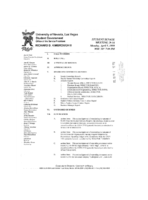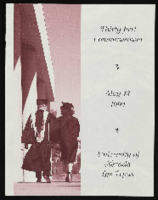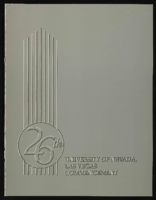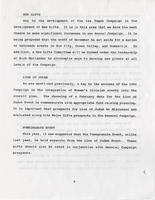Search the Special Collections and Archives Portal
Search Results
L. Paul Mercer Papers
Identifier
Abstract
The L. Paul Mercer Papers date from 1939-1970 and consist of personal correspondence, newspaper clippings, photographs, and textile samples dyed in the Native American tradition.
Archival Collection
Paul May Papers
Identifier
Abstract
The Paul May Papers (1963-1984) contain correspondence, reports and minutes from the Nevada Legislature, campaign materials, and invitations to various events.
Archival Collection
Center Stage, Inc. Records
Identifier
Abstract
The Center Stage, Inc. Records (1994 to 2008) are comprised of photographs, bylaws, correspondence, meeting minutes, publicity, scripts, programs, cast lists, and video cassettes of a number of the productions. Center Stage Theater Inc. was the first LGBT theater company in Las Vegas, Nevada.
Archival Collection
Nevada Official Bicentennial Book Collection
Identifier
Abstract
The Nevada Official Bicentennial Book Collection (1975) contains materials related to the editing and publication of the book by the Nevada American Revolution Bicentennial Committee. It includes article submissions about Nevada history as well as a small amount of correspondence to Stanley Paher, the editor of the book.
Archival Collection
Eberhardt and Aurora Mining Company Records
Identifier
Abstract
The Eberhardt and Aurora Mining Company Records (approximately 1869-1877) are comprised of the administrative records and financial documents of the mining company located in White Pine County, Nevada. The majority of the collection contains correspondence, but also includes several documents relating to the company's finances such as bills, receipts, cancelled checks, and bank statements.
Archival Collection

Meeting minutes for Consolidated Student Senate University of Nevada, Las Vegas, April 05, 1999
Date
Archival Collection
Description
Text

Jessica Guiao oral history interview: transcript
Date
Archival Collection
Description
Oral history interview with Jessica Guiao conducted by Grecia Lopez on November 22, 2022 for the Reflections: the Las Vegas Asian American and Pacific Islander Oral History Project. In this interview, Guiao recalls her childhood in Hayward, California, and being raised in Las Vegas, Nevada. She recalls not liking the climate of Nevada at first, and describes the friends she has made throughout her time in the city and the identity she has developed. Guiao discusses some of the pressures and stereotypes surrounding Asian Americans, such as what career path they should pursue or the aversion to embracing subcultures, and how she has consolidated her rebellion into her own identity. Throughout the interview, Guiao touches on other topics such as Filipino food, the long-standing history between Mexican and Filipino communities, Catholicism, goth culture, and anti-Asian hate and racism that she and her family has faced.
Text

University of Nevada, Las Vegas (UNLV) 31st commencement program
Date
Archival Collection
Description
Commencement program from University of Nevada, Las Vegas Commencement Programs and Graduation Lists (UA-00115).
Text

University of Nevada, Las Vegas (UNLV) 26th commencement program
Date
Archival Collection
Description
Commencement program from University of Nevada, Las Vegas Commencement Programs and Graduation Lists (UA-00115).
Text

